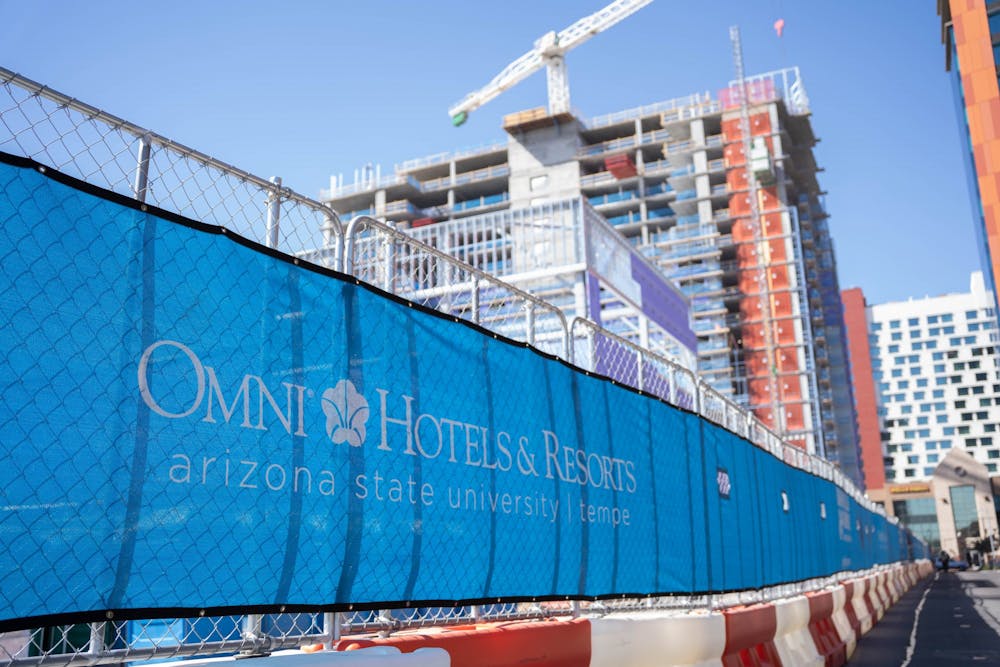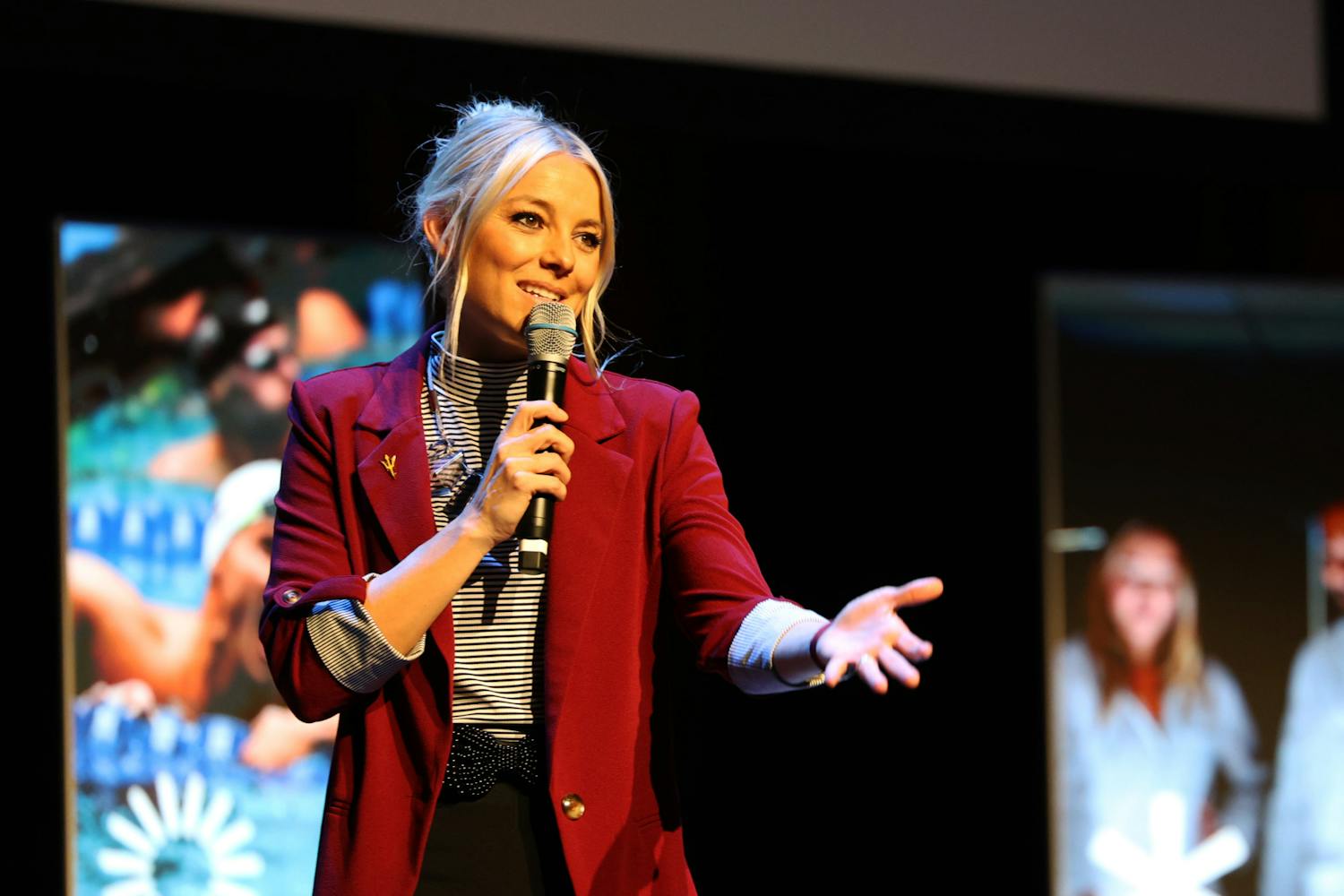The Omni Hotel is continuing construction on its highrise hotel near ASU's campus despite the Arizona Supreme Court ruling on April 5. Some complaints raised by the state's attorney general about the deal between the company and the Arizona Board of Regents can be reheard by a lower court.
The Supreme Court's unanimous opinion said a lower court can rehear Attorney General Mark Brnovich's arguments that claim the deal between Omni Hotels and ASU violated the Arizona constitution's gift clause and it did not benefit the state.
The Supreme Court agreed with previous rulings rejecting Brnovich's claims that the deal was illegal because the location on ASU's campus allowed Omni to avoid paying property taxes.
Omni has been under construction since September 2021. The $125 million facility located on University Drive and Mill Avenue will have 330 guest rooms, four dining options, retail and an almost 36,000-square-foot conference room. The hotel is set to open in April 2023.
Brnovich "applaud(ed)" the court for reviving his lawsuit against ABOR in a statement.
"From the very beginning, we said this lawsuit is about protecting hardworking Arizonans by ensuring that taxpayer funds are not used for private business deals," Brnovich said.
ASU President Michael Crow said in a statement Brnovich's claims that the project is an attempt to evade taxes are "discredited and illogical."
Jay Thorne, a University spokesperson, said ASU is not involved in construction, but "The work Omni is doing continues, unaffected by these proceedings."
Court affirms rejection of property tax avoidance argument
Omni and ASU entered into an agreement in 2016 to build a hotel on land owned by the University. Land owned by ASU and ABOR is tax-exempt because it is a state entity.
Omni agreed to pay ASU almost $6 million upfront to lease the land. It agreed to pay ASU an annual rent of about $1 million a year instead of paying property taxes. Property taxes collected by the county treasurer's office pay for public services such as schools, libraries and more.
The city of Tempe approved the project in 2018 along with up to $21 million in tax breaks. Omni will pay nearly no sales or transaction privilege taxes — a tax hotels must pay to do business in the state — for up to 30 years.
The structure of how Omni would pay ASU to lease the land, along with the large tax breaks, is what brought Brnovich to file his initial lawsuit in 2019, highlighting how the deal took funds away from public services.
"ABOR's mission is to run our state public universities, not extend government tax-exempt status to private corporations," Brnovich said to The State Press in 2019.
If Brnovich had succeeded in 2019, Omni would have been forced to pay property taxes and the deal could have been in jeopardy. But the tax court ruled in 2019 the deal did not enable Omni to evade paying property taxes, a decision the Supreme Court agreed with.
"For a conveyance to be made to evade taxation, there must be a tax to evade in the first place, and here there is none," the justices wrote in the opinion.
ABOR Chair Lyndel Manson said in a statement on April 5 the board is "pleased" with the court's ruling. "The court affirmed two lower court decisions that the property where Omni Tempe Hotel is being constructed is and has long been tax-exempt state land," Manson said.
Arguments for the deal not benefitting the state can be reheard
Brnovich argued in his initial lawsuit the deal did not benefit the state or ASU — he said ASU would only use the 36,000-square-foot conference room seven days a year. The tax court rejected the argument in 2019. The Supreme Court reversed the decision and said Brnovich can still argue ASU and ABOR unlawfully created a deal that did not benefit the state or for the University.
In 2019, Brnovich amended his initial lawsuit to include a claim arguing the deal violated the Arizona constitution's gift clause. The gift clause requires government spending to serve a public purpose rather than to fund private entities. The tax court denied Brnovich's complaints relating to the gift clause because the complaint was not filed within a year of the completion of the deal. The Supreme Court reverse the ruling and said the attorney general had five years to file a complaint.
Manson called the gift clause claims "meritless" and said, "the project the Attorney General has sought to derail is creating a significant community asset for ASU and the Tempe community."
Despite providing a $21 million tax break for the hotel, city of Tempe public information officer Kris Baxter-Ging said in a statement, "We don't have a stance on it," and said she could not comment on ongoing litigation.
Katie Conner, public information officer for the attorney general's office, did not respond to multiple calls from The State Press. It is unclear when Brnovich will return to the tax court to remake his claims or what would occur if the court sides with any of his remaining claims.
Crow said in a statement the project "represents an economic development win for the city, an operational asset to the University and the ASU community, and the sort of entrepreneurial focus state leaders and the Board of Regents have called upon our public universities to have."
Editors Jeffrey Horst and Piper Hansen contributed to this story.
Reach the reporter at mcfisch4@asu.edu and follow @morgfisch on Twitter.
Like The State Press on Facebook and follow @statepress on Twitter.

Morgan Fischer is the politics editor, she works with her desk to cover topics related to politics in the ASU community. She has previously worked as an intern for RightThisMinute.




